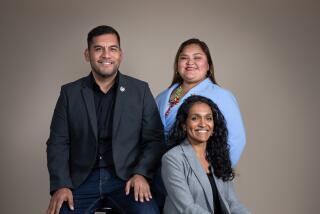Latinos Have Good Shot at City Council
The political truth is jarring: Huntington Park is more than 90% Latino but a Latino has never held a seat on the City Council.
But Tuesday’s election could make city history because Latinos are favored to capture at least one of three seats up for grabs.
Longtime incumbents William P. Cunningham and Jim Roberts are engaged in the toughest campaign of their political careers against two strong Latino candidates.
Cunningham, 50, and Roberts, 54, say they are walking more precincts than ever before. This year, for the first time, they attended a seminar on how incumbents can improve their chances of winning reelection.
“We will do what we feel we have to,” said Roberts, who has been on the council since 1970. Cunningham has served since 1977.
Raul Perez, a 47-year-old real estate loan officer, can smell victory. He came within 21 votes of being elected in 1988 despite being outspent 5 to 1 by the joint campaign of two incumbents.
Incumbents have been able to raise far more campaign money from developers and businessmen than their Latino challengers. Latino candidates have run and been defeated in every council race since 1970.
Perez has made Latino political representation a cornerstone of his campaign.
“The leadership should be able to communicate with the people,” said Perez, a native of Guadalajara, Mexico. “In many cases we come from the same place.”
The other Latino candidate, Luis Hernandez, has been giving the incumbents fits by repeatedly attacking them for the city’s recent financial problems. Those problems forced the layoffs of 25 employees last October.
But the 29-year-old financial analyst has shied away from saying the city’s predominantly Latino population would be better served by Latino council members.
“I’m a candidate first and a Hispanic second,” Hernandez said.
Latino political representation is an issue the incumbents have downplayed but not ignored.
In one of their early mailers, Cunningham and Roberts, both Anglo, told voters “that all citizens of Huntington Park should receive equal service from the city without regard for race, creed, sex or economic level.”
The incumbents deny that Latino representation will be a key factor in Tuesday’s balloting.
“To me it’s not an issue,” Cunningham said.
Last year, Latinos accounted for 90.6% of the city’s 59,000 residents, according to projections from the 1980 U.S. census. But despite their numbers, Latinos have had little political clout in Huntington Park because many are not citizens.
The chances of a Latino winning a seat this year were greatly improved when Herbert A. Hennes Jr. decided to retire for personal reasons. He had been a councilman since 1970.
But local political observers say the drought for Latino candidates may have ended anyway. Voter registration figures indicate that more Latinos are becoming settled in the city and taking an interest in local politics.
In 1975, for example, Latinos accounted for 21% of the city’s registered voters, according to a survey by former council candidate Richard Loya. By 1988, Latinos made up 53.3% of the city’s registered 7,800 voters, according to a survey commissioned by the Los Angeles office of the Southwest Voter Registration Education Project, a Texas-based organization that has spearheaded numerous get-out-the-vote campaigns on behalf of Latinos.
The change apparently has favored Latino candidates because the incumbents’ margin of victory has slipped dramatically over the years.
More to Read
Sign up for Essential California
The most important California stories and recommendations in your inbox every morning.
You may occasionally receive promotional content from the Los Angeles Times.










